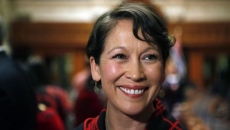The Canadian economy added 55,000 jobs in December before COVID-19 cases began spiking at the end of the month, prompting public health restrictions that forced many businesses to close or curtail operations.
Dominique Lapointe, senior economist at Laurentian Bank Securities, said the report provides a snapshot of the economy before the Omicron variant.
"It has to be taken with a grain of salt, but what it says is before the variant the employment situation was really strong," he said.
"The overall report is showing double the employment gains we were expecting."
The report was based on survey results done during the week of Dec. 5 to 11, before the public health restrictions were put in place to slow the latest surge in COVID-19 cases.
The highly transmissible Omicron variant has fuelled a record spike in COVID-19 cases with daily increases in new cases in the tens of thousands in recent days.
In its labour force survey, Statistics Canada said the unemployment rate edged down to 5.9 per cent compared with 6.0 per cent in November.
It was the lowest unemployment rate since February 2020 before the pandemic when it was 5.7 per cent and half of a percentage point off the record low of 5.4 per cent set in May 2019.
Statistics Canada also said the number of jobs was up by 886,000 compared with December 2020 and up by 240,500 compared with February 2020 before the pandemic.
#Employment rose by 55,000 (+0.3%) in December, while the #unemployment rate was little changed at 5.9%. Gains were driven by the construction and educational services industries. https://t.co/b3UQpbKVi1 pic.twitter.com/houJdz9zpL
— Statistics Canada (@StatCan_eng) January 7, 2022
The employment report came ahead of the Bank of Canada's rate decision and monetary policy report on Jan. 26. The central bank is expected to start raising its key interest rate target later this year.
Last month, in the renewal of its monetary policy framework agreement with the federal government, the Bank of Canada agreed to maintain the central bank's inflation target range of one to three per cent, but also more formally keep tabs on the labour market when making interest rate decisions.
Lapointe said the December jobs report suggests the economy was close to full employment.
"That's something the Bank of Canada has been looking for before starting to raise interest rates for sure," he said.
Lapointe expects the central bank will wait until April before it starts to raise interest rates, but added there is a chance it might move earlier.
"Because of the uncertainty related to the variant, we think it is a bit premature to start raising rates as soon as in two weeks," he said, adding that Statistics Canada will release its next inflation report on Jan. 19 before the central bank's interest rate decision.
Lapointe said he expects the inflation report to show the annual pace of price increases to rise to five per cent or maybe just a little over that mark.
TD Bank senior economist Sri Thanabalasingam said the job increase for December was well above the consensus call for a gain of 25,000 jobs for the month.
"With daily caseloads rising at an incredible pace and provinces tightening the screws on mobility, January labour market figures are likely to be more downbeat," Thanabalasingam wrote in a report.
"Hopefully, the impact of Omicron will be short-lived, allowing the labour market to recover quickly in coming months."
The overall increase in jobs in December was due to a gain in full-time jobs of 123,000, while part-time employment fell by 68,000 for the month.
The gain in jobs in December was driven by the construction and educational services industries.
The construction industry added 27,000 jobs for the month, its first increase since August, however the sector still remains 41,000 below its pre-COVID-19 February 2020 mark.
Educational services gained 17,000 jobs in December.
Average hourly wages were up 2.7 per cent compared with a year earlier.
Statistics Canada is scheduled to release its January jobs report on Feb. 4.






